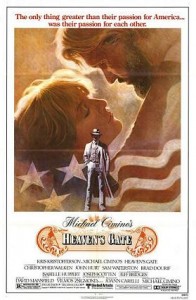 “Heaven’s Gate” has become an infamous cautionary tale of Hollywood, which to this day still makes MGM cringe at the financial mistake they made. Michael Cimino was considered a wunderkind shortly after the critical success of “The Deer Hunter,” which is why MGM jumped at the chance to work with him. The studio allowed the Oscar-winning Cimino an unlimited resource of talent and money in hopes of duplicating the previous success. Unfortunately, nobody could have foreseen that Cimino was creating the most expensive art-house picture in history.
“Heaven’s Gate” has become an infamous cautionary tale of Hollywood, which to this day still makes MGM cringe at the financial mistake they made. Michael Cimino was considered a wunderkind shortly after the critical success of “The Deer Hunter,” which is why MGM jumped at the chance to work with him. The studio allowed the Oscar-winning Cimino an unlimited resource of talent and money in hopes of duplicating the previous success. Unfortunately, nobody could have foreseen that Cimino was creating the most expensive art-house picture in history.
In the late ‘70s, a $36 million budget was pretty steep, and the future success of MGM as a studio depended on this feature being marketable, which it was not. In fact, audiences and critics seemed to agree that Cimino’s career was over, and MGM was almost history as a movie studio.
The story is set along the backdrop of the land wars between immigrant farmers and cattle baron in Wyoming during the 1890s. The bleak and slowly paced story becomes inconsequential to the breathtakingly dusty, smoky and beautiful photography by Vilmos Zsigmond. His work on the picture places you in Wyoming, allowing you to see the sights and feel the tension that is brewing between the immigrants and the citizens.
This world is seen through the eyes of James Averill, who is wonderfully played by Kris Kristofferson. At this point in time, Kristofferson had made a successful and comfortable transition from country singer to leading man, which was destroyed by the universal hatred of this picture. That aside, he gives a mannered performance as a man who is forced to come to terms with a decaying, immoral society. His major decision is whether or not he should flee or stay and help. Nothing about this character wants to be a hero, but through inevitable circumstances, he decides to stand up for the immigrants.
Jeff Bridges gives a stellar supporting performance that adds a light tone to the picture and the grim but brutally honest performance of Kristofferson. His character, John L. Bridges, owns a roller rink in town and allows the immigrants to hold cockfights in his bar on Sunday mornings. He is also the only honest friend that Averill can confide in.
A testament to Bridges’ career is that he survived through several universally panned films at this point in his career. The 1976 remake of “King Kong” was considered a travesty; he followed that with “Heaven’s Gate” and “Tron,” which wasn’t admired until years later.
The cast is rounded out by an amazing cast of wonderful character actors, including Oscar winner Christopher Walken, the always wonderful John Hurt, Joseph Cotton, Brad Dourif and the solid Sam Waterston. On top of that, it provides audiences with a brief introduction to the career of Mickey Rourke.
The only drawback is that Hurt’s character, Billy Irvine, is never fully fleshed out. Early on, it is presented to the audience that he is an alcoholic, but it is never made clear what side of the struggle he is on. He opposes the barons, but is later seen fighting alongside them, which is something Cimino should have rewritten. A deciding factor could have been that Hurt was briefly released from the picture to film “The Elephant Man.”
The film started out as a five-hour and 20 minute feature, which Cimino trimmed down to three hours and 39 minutes after a nightmarish screening for the producers. The studio eventually attempted to release the picture at two hours, which left audiences in the dark on the abstract meaning of the picture.
Despite a 219-minute running time, the picture contains very little action, and that may have turned audiences off, but the picture is an amazing experience of panoramic scope and beauty.
A movie is supposed to transport you to another time and place. “Heaven’s Gate” succeeds in providing that to the audience, and is an underrated, misunderstood classic.

United Artists was the company behind Heaven’s Gate. MGM bought UA after Heaven’s Gate flopped.